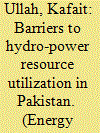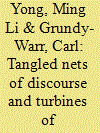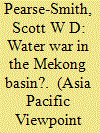|
|
|
Sort Order |
|
|
|
Items / Page
|
|
|
|
|
|
|
| Srl | Item |
| 1 |
ID:
166923


|
|
|
|
|
| Summary/Abstract |
The share of hydro power in the energy mix of Pakistan has not exceeded beyond 40% despite abundant hydro-power potential in the country. Owing to the slow pace of hydro-power development under the public sector, various policy frameworks and institutional arrangements have been introduced to develop the resources by involving the private sector. Even those arrangements have not succeeded in directing the attention of private investment towards the hydropower but the thermal sector. This study investigates the reasons behind the slow progress of hydro-power sector in Pakistan. A mixed approach comprising NVIVO analysis and Q methodology has been used to explore the impending reasons. Both, primary and secondary data, in the form of interviews, published reports, papers and other documents related to the hydro-power sector of Pakistan were collected for the analysis purpose. NVIVO analysis of primary and secondary data identified important variables that were further used for Q methodology. Q methodology revealed four important discourses on barriers to the hydro-power development in Pakistan. Discourses included less participation of private sector in running the electricity market operations, incoherent planning, financial barriers and institutional barriers. The revelation of these discourses is important for framing policies on the development of indigenous renewable energy resources in Pakistan.
|
|
|
|
|
|
|
|
|
|
|
|
|
|
|
|
| 2 |
ID:
153353


|
|
|
|
|
| Summary/Abstract |
Hydropower dams are back in the spotlight owing to a shifting preference for low carbon energy generation and their possible contribution to mitigating climate change. At the forefront of the renaissance of large hydropower dams are Chinese companies, as the builders of the world's largest dams at home and abroad, opening up opportunities for low- and middle-income countries. However, large hydropower dams, despite their possible developmental and carbon reduction contributions, are accompanied by huge economic costs, profound negative environmental changes and social impacts. Using fieldwork data from four hydropower projects in Ghana, Nigeria, Cambodia and Malaysia, this paper evaluates the behaviour of Chinese stakeholders engaged in large hydropower projects in Asia and Africa. We do this by first exploring the interests of the different Chinese stakeholders and then by investigating the wider implications of these Chinese dams on the local, national and international contexts. The paper concludes that hydropower dams will continue to play a prominent role in future efforts to increase energy security and reduce energy poverty worldwide, therefore the planning, building and mitigation strategies need to be implemented in a more sustainable way that takes into account national development priorities, the needs of local people and the impacts on natural habitats.
|
|
|
|
|
|
|
|
|
|
|
|
|
|
|
|
| 3 |
ID:
174813


|
|
|
|
|
| Summary/Abstract |
Increasing demands for energy to boost the Mekong economies have attracted the keen interest of riparian countries for hydropower development. This is evidenced by extensive investment in hydropower projects across the region over the last few decades. Drawing on interviews with key stakeholders, including officials from Ministry of Energy and Mines, Ministry of Natural Resources and Environment, Ministry of Agriculture and Forestry, private sector actors, civil society organisations and academics, as well as secondary data from public and policy resources, this paper aims to examine how the government of Laos' (GoL) decisions in hydropower development are influenced by regional energy dynamics, and how these shape the country's future energy development. The paper argues that the GoL's decisions on hydropower development are highly dilemmatic, given the current limited institutional capacity in hydropower governance and the accelerating evolution of alternative energy in neighbouring countries. While uncertainty in power markets is recognised, this places greater pressure on new hydropower projects as to how much power could be sufficiently produced and exported. The paper calls for GoL's policy considerations on the development and planning of alternative energy to secure the sustainable and equitable use of water resources as stipulated in the 1995 Mekong Agreement.
|
|
|
|
|
|
|
|
|
|
|
|
|
|
|
|
| 4 |
ID:
138155


|
|
|
|
|
| Summary/Abstract |
In 2002, Hu Jintao introduced his concept of a harmonious society (和 諧社會) in which he introduced the concept of putting people first (以 人為本), a guiding principle for many of the policies to come, including new resettlement regulations governing water resources and hydropower projects published in 2006. Drawing on fieldwork conducted in resettlement communities along the Lancang River in Yunnan province, this article analyzes the manner in which the local government manages the implementation of a more socially-oriented resettlement policy. While formerly local cadres tended to use force in order to fulfill policy requirements demanded from above, in line with new upper-level requirements, local governments have begun to devise a variety of strategies including soft coercion, negotiation, and propaganda work to implement resettlement policies, thereby providing evidence of a softer type of authoritarianism at the grassroots level
|
|
|
|
|
|
|
|
|
|
|
|
|
|
|
|
| 5 |
ID:
123513


|
|
|
|
|
| Publication |
2012.
|
| Summary/Abstract |
Hydropower development on the mainstream of the Mekong River in the Lower Mekong Basin (lmb) has become one of the most pressing issues on the development agenda, being touted as the way forward in solving energy, development and sustainability needs in the region. Despite dominant and compelling arguments in favour of such development, a growing anti-dam lobby has taken to arguing that hydropower development will threaten the economic, social, environmental and food security of some 62 million people living in the lmb. The anti-dam lobby comprises a heterogeneous assemblage of actors, agencies and networks, working to provide critical and alternative geographical (re)imaginations of the lmb. This paper explores these multiple perspectives afforded by the anti-dam lobby through the lens of knowledge production. The anti-dam lobby, it will be seen, engages in a politics of legitimacy and re-scaling with the pro-hydropower lobby, played out through varying strategies, while highlighting urgent and critical knowledge gaps which need to be taken seriously for future development in the lmb.
|
|
|
|
|
|
|
|
|
|
|
|
|
|
|
|
| 6 |
ID:
115237


|
|
|
|
|
| Publication |
2012.
|
| Summary/Abstract |
The Mekong River system provides a crucial source of natural resources for riparian nations. However, the increasingly rapid pace of hydro-development in the Mekong Basin is threatening the integrity of the river system, posing a real concern for Lower Basin states, which are particularly dependent on the basin. This scenario has led to warnings of armed conflict, or even 'water war', between riparian states. Certainly, the expanding scale of hydro-development can be expected to continue increasing interstate tensions in the Mekong region; but are these tensions really likely to escalate to armed conflict? This paper explores this question by drawing on the water and conflict theory of Aaron Wolf. Ultimately, this paper concludes that interstate tensions over Mekong hydro-development are unlikely to generate armed conflict. This is in part due to the strategic impracticality of such a conflict as well as the presence of a river basin management institution. Most compellingly, though, armed conflict is unlikely because the economic imperative shared by Mekong states is better served by cooperation - or at least non-interference - than conflict, over regional hydro-development. In closing, the paper urges that the study of water and conflict in the Mekong Basin be refocused at the intrastate level.
|
|
|
|
|
|
|
|
|
|
|
|
|
|
|
|
|
|
|
|
|